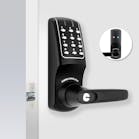It is an all-too-common tale: a job is finished and it is time for the inspectors to show up and sign-off on the entire project. Unfortunately, they find the doors and hardware are not to code. This comes as a surprise. The design team relied on the same code information used on its last building and… this facility has different requirements.
This scenario shows why it is important to get your manufacturer’s hardware consultants involved early in the planning of a building. With the hardware consultant collaborating from the beginning, problems can be avoided later. Building codes will ultimately tie into the planning for the access control system being proposed. While we are recognized around the world for our building safety, it is our codes that ensure someone is taking the responsibility—and liability—for life safety, fire doors, and security.
Regardless of the quality and craftsmanship of the door hardware being specified, if it is not properly incorporated into a building, the full value goes unrealized. Hardware consultants are well-versed on local and national building codes, the unique needs of various types of facilities, and access control and egress requirements — all the things needed to specify door hardware solutions.
The challenge is there is such a wide range of codes. These codes have been developed over time to incorporate best practices and ensure new build methods and materials can be used. As a result, design/construction professionals can face an overwhelming amount of information. To make matters worse, some inspectors are not fully aware of every aspect of the building and, as a result, miss some important points related to doors and hardware.
In addition to recommendations, good hardware consultants communicate any issues or areas of concern and work to identify the best solutions. They provide customized solutions that are both esthetically and functionally appropriate.
Ask for the Following…
Hardware consultants also prepare a complete hardware specification, hardware sets, and numerical door index. The consultant should:
- Provide product catalogue cuts and riser diagrams/electrical elevations;
- Assist with product substitution requests, application and product questions/requests for information (RFIs), and the value engineering process;
- Review and comment on hardware submittals;
- Offer certified training on building codes, open architecture, electronic access control, vertical market topics, and mechanical hardware;
- Consult on necessary building codes to ensure fire, life-safety, and accessibility requirements are met;
- Review building programming, product options, and potential conflicts with security issues; and
- Conduct jobsite reviews, pre-installation meetings, and post-installation inspections.
This level of before-project planning will help ensure the building passes its door inspection at the end of the project.
Alan D. McMurtrie, DAHC, is national specifications manager for Allegion Canada




